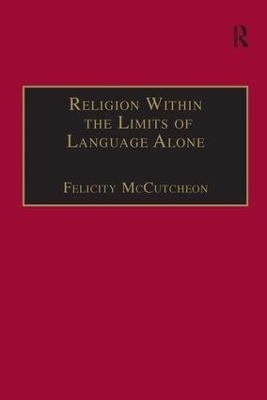
Religion Within the Limits of Language Alone
Routledge (Verlag)
978-0-7546-1442-5 (ISBN)
Felicity McCutcheon
Contents: Preface; Wittgenstein’s Philosophical Ambition: The pursuit of perspicuity; The goal of the Tractatus; The transition; The goal of the Philosophical Investigations (the elimination of philosophical puzzles); Objectivity and the limits of language; The struggle with language; Perspicuity, Justice and Peace: Philosophical explanations and justice; Seeing connectionsnot causes; Parallels between aesthetics, psycho-analysis and philosophy; What perspicuity achieves; Grammar: Wittgenstein on grammar - exegetical; The development of the concept of grammar; The autonomy of language; Language-games, rules and meaning; Training and Augustine’s infant; Training and the giving of examples; Forms of life and the possibility of meaning; Language as both arbitrary and necessary; Agreement in conventions and agreement in behaviour; What then is meaning?; Grammar, rules and reality; The positivists on grammar and reality; Carnap on meaning and ontology; Wittgenstein on the connection between language and reality; Grammar as the connection between word and world; Wittgenstein on the accountability of grammar to reality; Wittgenstein and ontology; Religious Language as Grammar: Some preliminary remarks; Self-evidence and logic; The nature of basicality; Basicality and truth; World pictures and pictures of the world; The reality of God; Conflating grammar and beliefs; Expressivism: Section One: The cognitive/non-cognitive distinction; The nature of cognitivity; What motivates non-cognitivism or expressivism?; Speaking for oneself; Section Two: Expressive as primitive; Language and reality: some preliminary remarks; Language as expressive behaviour; Concept-formation, behaviour and beliefs; Language, beliefs and reality - concluding remarks; Section Three: Wittgenstein and expressivism; Grammatical differences and substantive disputes; Conclusion; Some Concluding Remarks; Bibliography; Index.
| Erscheint lt. Verlag | 11.7.2001 |
|---|---|
| Reihe/Serie | Heythrop Studies in Contemporary Philosophy, Religion and Theology |
| Verlagsort | London |
| Sprache | englisch |
| Maße | 156 x 234 mm |
| Gewicht | 544 g |
| Themenwelt | Geisteswissenschaften ► Philosophie ► Philosophie der Neuzeit |
| Geisteswissenschaften ► Religion / Theologie | |
| ISBN-10 | 0-7546-1442-5 / 0754614425 |
| ISBN-13 | 978-0-7546-1442-5 / 9780754614425 |
| Zustand | Neuware |
| Haben Sie eine Frage zum Produkt? |
aus dem Bereich


